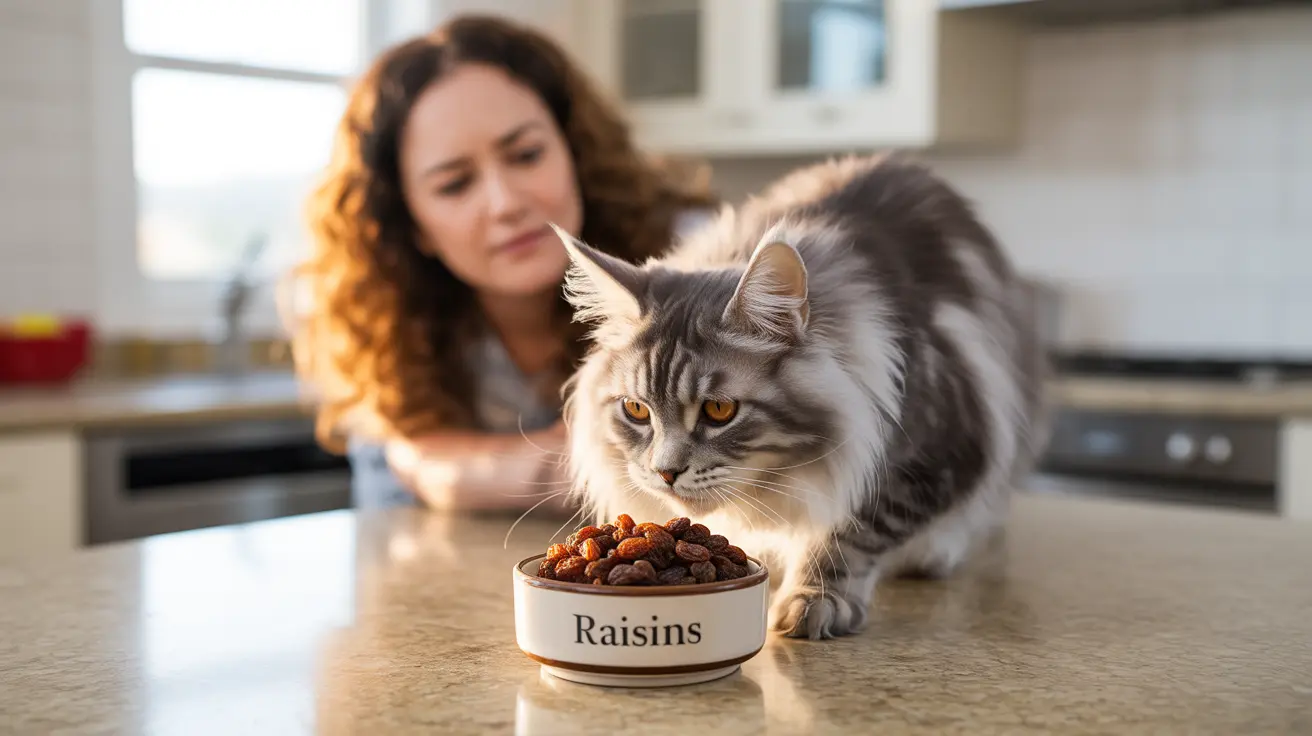As a cat owner, you might wonder about sharing human snacks with your feline friend. When it comes to raisins, the answer is absolutely clear: cats should never eat raisins under any circumstances. These dried fruits, while healthy for humans, pose a serious health risk to cats and can lead to severe complications, including kidney failure.
Understanding the dangers of raisins for cats is crucial for every pet owner, as even a small amount can trigger potentially life-threatening reactions. Let's explore why raisins are toxic to cats and what you should do if your feline companion accidentally consumes them.
The Dangers of Raisin Toxicity in Cats
Raisins contain compounds that are highly toxic to cats, though scientists haven't yet identified the exact substance responsible for this toxicity. What we do know is that these dried grapes can cause severe reactions in cats, regardless of the amount consumed.
The mystery surrounding raisin toxicity makes it even more dangerous, as there's no established "safe" amount. Some cats might show severe symptoms after eating just one raisin, while others might become ill after consuming more. This unpredictability makes it essential to prevent any exposure to raisins.
Symptoms of Raisin Poisoning in Cats
If your cat manages to eat raisins, they may exhibit several concerning symptoms within 12-24 hours of ingestion:
- Vomiting (usually the first sign)
- Lethargy and weakness
- Decreased urination or complete cessation
- Abdominal pain
- Dehydration
- Loss of appetite
- Unusual drooling
Understanding Kidney Failure Risk
The most severe consequence of raisin consumption in cats is acute kidney failure. This condition can develop rapidly and requires immediate medical intervention. The kidneys may stop functioning properly, leading to a build-up of toxins in the body that can become life-threatening if not treated promptly.
Prevention and Safe Food Alternatives
The best way to protect your cat from raisin toxicity is through prevention. Store raisins and products containing raisins (like cereals, granola, and baked goods) in secure containers and out of your cat's reach. Instead of raisins, consider these safe fruit alternatives for occasional treats:
- Small pieces of apple (without seeds)
- Banana slices
- Blueberries
- Watermelon (seedless)
Emergency Response to Raisin Ingestion
If you suspect your cat has eaten raisins, time is of the essence. Don't wait for symptoms to appear before taking action. Contact your veterinarian or emergency animal hospital immediately. The sooner treatment begins, the better the chances of preventing severe complications.
Frequently Asked Questions
Can cats eat raisins safely, or are they toxic to felines?
No, cats cannot safely eat raisins. They are highly toxic to felines and can cause severe health complications, including kidney failure. There is no safe amount of raisins for cats to consume.
What are the signs of raisin poisoning in cats, and how soon do symptoms appear?
Signs of raisin poisoning typically appear within 12-24 hours and include vomiting, lethargy, decreased urination, abdominal pain, and dehydration. Some cats may show symptoms more quickly or severely than others.
What should I do if my cat accidentally eats a raisin?
If your cat eats a raisin, seek immediate veterinary care. Don't wait for symptoms to appear, as early intervention is crucial for preventing severe complications. Contact your vet or emergency animal hospital right away.
How are grapes and raisins toxic to cats, and is there a known safe amount?
The exact compound that makes grapes and raisins toxic to cats is unknown. There is no known safe amount - even a single raisin could potentially cause severe reactions in some cats.
What fruits are safe for cats to eat if I want to give them a treat?
Safe fruits for cats include small amounts of apple (without seeds), banana, blueberries, and seedless watermelon. Always introduce new foods gradually and in moderation, and consult with your veterinarian first.
Remember, while it's natural to want to share treats with your cat, it's essential to stick to foods that are known to be safe for feline consumption. When in doubt, consult with your veterinarian about appropriate treats for your cat, and always keep harmful foods like raisins safely out of reach.






